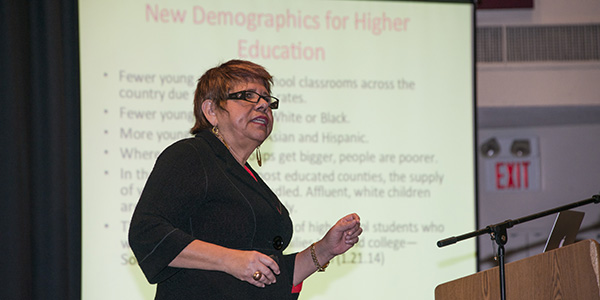Terry Piper Lecturer Encourages CSUN to Remain Focused on Student Success

Laura Rendón, a nationally recognized scholar and professor of higher education at the University of Texas-San Antonio. This year’s selected Terry Piper Lecturer. Photo by Lee Choo.
Laura Rendón, a nationally recognized scholar and professor of higher education at the University of Texas-San Antonio, encouraged attendees at California State University, Northridge’s third annual Terry Piper Lecture to attend to the education of the “whole” student “intellectually, socially and spiritually” in an effort to help first-generation and low-income students succeed.
Rendón, credited with developing the theory of validation, which colleges and researchers have employed as a framework for working with and affirming students of color, spoke to a packed room on March 3 in the University Student Union’s Northridge Center.
“Our mentality needs to be that students have strenghts and assets,” Rendón said. “That they are welcomed at Northridge .. that they can succeed.”
She said first-generation and low-income students of color bring assets to the table including adaptability, resiliency and cultural wealth. She also acknowledged CSUN for the work that is being done here to foster an asset based institutional framework.
“I was inspired and impressed with the commitment and energy to foster student success (at CSUN),” Rendón said after her lecture.
The event is named after Piper, who served as vice president of student affairs for nearly 10 years and strove to actively partner with campus colleagues in support of student success as a member of CSUN’s executive leadership team. He is credited with reshaping CSUN’s Division of Student Affairs to align with the most current thinking and practices that support student learning and success. Piper passed away on May 13, 2010, after a battle with melanoma.
“This lecture series was conceived for the purpose of gathering faulty, staff, administrators from all areas of the campus to acknowledge the interconnectedness and responsibility jointly for supporting students in their learning and success,” said William Watkins ’74 (Urban Studies), CSUN’s vice president of student affairs and dean of students, to the audience. He said the event continues the legacy of Piper’s work as an innovator and promoter of applied theory to practice, particularly as it related to accountability of learning and development.
Rendón drew from her own personal experience as a first-generation, bilingual and low-income student for the presentation, which was titled, “Leveraging Student Strengths to Support Student Success.” She started her education at a community college and went on to earn a doctorate in higher education administration from the University of Michigan, Ann Arbor. She said student success depends on both the institution and the student.
“An institution wide asset based framework … shatters the paradigm where deficits about students are emphasized,” she said. “The focus is on the possibilities rather than the problems.”

 experience
experience